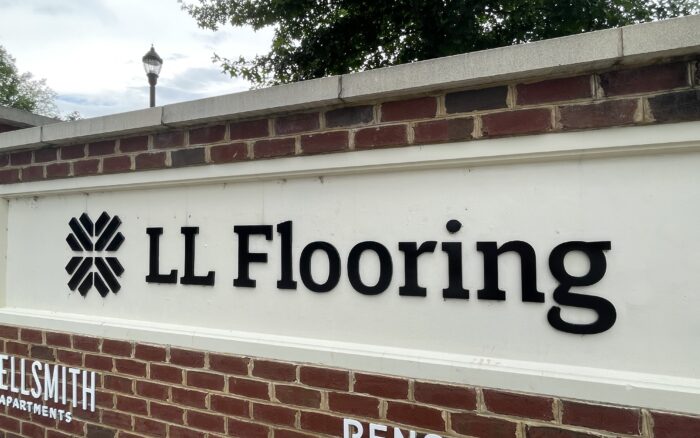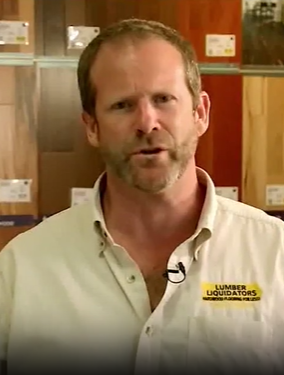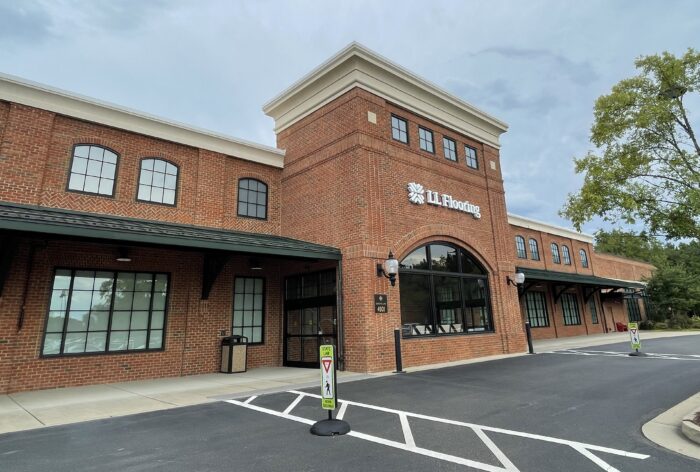Earlier this summer, as Thomas Sullivan pushed to change the direction of foundering LL Flooring, he pondered what he might do if he were able to once again hold sway over the company he founded 30 years ago.
In a brief, previously unpublished interview with Richmond BizSense in June, Sullivan explained some of the goals of his pursuit to acquire control of the publicly traded Henrico-based retailer, which he launched as Lumber Liquidators in the mid-1990s but hasn’t helmed in nearly a decade.
“In the last year or so, people in the stores were telling me it was the complete opposite of how we used to run…and the culture had gone away from what we had built,” Sullivan said in the June 6 interview. “I’m just looking to get the culture back. We just need to get it back to the basics of a good product at a good price.”
Sullivan at the time had halted his previously unsuccessful attempts to purchase control of LL Flooring and take it private. Instead, he was locked in a proxy battle to gain seats for him and a few allies on the publicly traded company’s board of directors.
His goal at that point in June was to influence the company as a director in the hopes of ushering in a leadership change and helping it regain its footing in the face of continued losses and stock price in free-fall.
Now, three months later, the story has been turned on its head and Sullivan is on the verge of doing much more than just gaining a few board seats.
LL Flooring filed for Chapter 11 bankruptcy protection on Aug. 11. It hoped the bankruptcy process would buy it time to line up a suitor willing to purchase the bulk of its assets. Several interested parties stepped up, including Sullivan’s private equity firm F9 Investments.
However, LL rejected the offers it initially received and announced last week it was pivoting into a full-scale liquidation – meaning it intended to go out of business entirely.
But a few days later it pulled another dramatic pivot. This time it said it wouldn’t go out of business after all and had re-entered negotiations with Sullivan and F9 for a “going-concern” asset sale.
The deal calls for Sullivan to purchase 219 of the chain’s 430 stores for an undisclosed sum. He and F9 would also purchase all of the company’s intellectual property, including its name.
Those terms of the sale, which is subject to bankruptcy court approval, would seem to align with at least some of what Sullivan had in mind for the company when he spoke with BizSense in June.
“I don’t know exactly what needs to be done… (but it has) too many stores, too many people, too much overhead,” he said.
Representatives of Sullivan and F9 did not respond to a request for comment by press time regarding the pending asset purchase.
Sullivan in June recalled some of the history of Lumber Liquidators. He said he opened the company’s first store in Boston on Jan. 5, 1996, after a career as a contractor.
It expanded around the Northeast before making its way to Virginia with a store in Colonial Heights.
The chain grew to more than 300 stores during Sullivan’s tenure, eventually moving its headquarters to Toano, near Williamsburg.
“We started with a beat-up pickup truck, but I always had a dream of a nationwide-type business,” he said. “It was something special. We just worked our ass off and built a great company.”
Lumber Liquidators went public on the New York Stock Exchange in 2007, a milestone Sullivan recalled fondly.
“The night before we went on the New York Stock Exchange they had a big 300-foot banner with the Lumber Liquidators name and black and yellow (the colors of the company’s logo at the time). It was a kind of a dream come true,” he said.
Sullivan also shared his disdain for a fateful “60 Minutes” exposé in 2015, which claimed the company’s imported products contained unsafe levels of formaldehyde. The fallout from that report and other legal issues at the time sent the company into a decline that culminated in with last month’s bankruptcy.
Sullivan, who publicly disputed the damning report at the time and left the company in 2016, said in June, “The damage was done and the short sellers made a lot of money.”
Asked in June what else led to the company’s precarious position, Sullivan questioned the LL’s current leadership, arguing they’ve been more focused on near-term results rather than thinking long-term.
“People were living quarter to quarter,” he said.
He also questioned the company’s expense controls, including its decision two years ago to move to a new headquarters in the Libbie Mill development in Henrico.
“They keep saying the economy (is to blame). At Lumber Liquidators we went through much worse times than there are now. I don’t think the economy is the problem,” he said.
There is one area of the company’s operations on which Sullivan and LL seem to agree. The company said in bankruptcy filings that the LL Flooring brand hasn’t caught on and was “further exasperating the company’s recent financial difficulties.” The name was introduced two years ago to replace Lumber Liquidators and try to shed some of the PR baggage from the “60 Minutes” saga and other issues.
Sullivan feels the same way about the new name and said he’d aim to bring back the original Lumber Liquidators flag.
“It got replaced with an unrecognizable logo and unrecognizable name,” he said.
F9’s pending asset purchase is set to be considered in bankruptcy court in Delaware on Sept. 16. The full financial terms of the deal have yet to be disclosed.
F9 previously proposed an asset purchase plan valued at roughly $66 million, through which it would have kept 219 of the chain’s stores and retained 750-1,000 of the company’s 2,000 employees. However, that offer was rejected by LL.
F9 put down an escrow deposit of $4.1 million for this latest deal.
F9 remains LL’s largest shareholder, though those shares are now worth nearly nothing in light of the bankruptcy. Sullivan is also LL’s biggest landlord, owning several dozen retail spaces that are leased to the company’s stores. He also owns retail chain Cabinets To Go, which he said has around 105 stores and about 600 employees.
Earlier this summer, as Thomas Sullivan pushed to change the direction of foundering LL Flooring, he pondered what he might do if he were able to once again hold sway over the company he founded 30 years ago.
In a brief, previously unpublished interview with Richmond BizSense in June, Sullivan explained some of the goals of his pursuit to acquire control of the publicly traded Henrico-based retailer, which he launched as Lumber Liquidators in the mid-1990s but hasn’t helmed in nearly a decade.
“In the last year or so, people in the stores were telling me it was the complete opposite of how we used to run…and the culture had gone away from what we had built,” Sullivan said in the June 6 interview. “I’m just looking to get the culture back. We just need to get it back to the basics of a good product at a good price.”
Sullivan at the time had halted his previously unsuccessful attempts to purchase control of LL Flooring and take it private. Instead, he was locked in a proxy battle to gain seats for him and a few allies on the publicly traded company’s board of directors.
His goal at that point in June was to influence the company as a director in the hopes of ushering in a leadership change and helping it regain its footing in the face of continued losses and stock price in free-fall.
Now, three months later, the story has been turned on its head and Sullivan is on the verge of doing much more than just gaining a few board seats.
LL Flooring filed for Chapter 11 bankruptcy protection on Aug. 11. It hoped the bankruptcy process would buy it time to line up a suitor willing to purchase the bulk of its assets. Several interested parties stepped up, including Sullivan’s private equity firm F9 Investments.
However, LL rejected the offers it initially received and announced last week it was pivoting into a full-scale liquidation – meaning it intended to go out of business entirely.
But a few days later it pulled another dramatic pivot. This time it said it wouldn’t go out of business after all and had re-entered negotiations with Sullivan and F9 for a “going-concern” asset sale.
The deal calls for Sullivan to purchase 219 of the chain’s 430 stores for an undisclosed sum. He and F9 would also purchase all of the company’s intellectual property, including its name.
Those terms of the sale, which is subject to bankruptcy court approval, would seem to align with at least some of what Sullivan had in mind for the company when he spoke with BizSense in June.
“I don’t know exactly what needs to be done… (but it has) too many stores, too many people, too much overhead,” he said.
Representatives of Sullivan and F9 did not respond to a request for comment by press time regarding the pending asset purchase.
Sullivan in June recalled some of the history of Lumber Liquidators. He said he opened the company’s first store in Boston on Jan. 5, 1996, after a career as a contractor.
It expanded around the Northeast before making its way to Virginia with a store in Colonial Heights.
The chain grew to more than 300 stores during Sullivan’s tenure, eventually moving its headquarters to Toano, near Williamsburg.
“We started with a beat-up pickup truck, but I always had a dream of a nationwide-type business,” he said. “It was something special. We just worked our ass off and built a great company.”
Lumber Liquidators went public on the New York Stock Exchange in 2007, a milestone Sullivan recalled fondly.
“The night before we went on the New York Stock Exchange they had a big 300-foot banner with the Lumber Liquidators name and black and yellow (the colors of the company’s logo at the time). It was a kind of a dream come true,” he said.
Sullivan also shared his disdain for a fateful “60 Minutes” exposé in 2015, which claimed the company’s imported products contained unsafe levels of formaldehyde. The fallout from that report and other legal issues at the time sent the company into a decline that culminated in with last month’s bankruptcy.
Sullivan, who publicly disputed the damning report at the time and left the company in 2016, said in June, “The damage was done and the short sellers made a lot of money.”
Asked in June what else led to the company’s precarious position, Sullivan questioned the LL’s current leadership, arguing they’ve been more focused on near-term results rather than thinking long-term.
“People were living quarter to quarter,” he said.
He also questioned the company’s expense controls, including its decision two years ago to move to a new headquarters in the Libbie Mill development in Henrico.
“They keep saying the economy (is to blame). At Lumber Liquidators we went through much worse times than there are now. I don’t think the economy is the problem,” he said.
There is one area of the company’s operations on which Sullivan and LL seem to agree. The company said in bankruptcy filings that the LL Flooring brand hasn’t caught on and was “further exasperating the company’s recent financial difficulties.” The name was introduced two years ago to replace Lumber Liquidators and try to shed some of the PR baggage from the “60 Minutes” saga and other issues.
Sullivan feels the same way about the new name and said he’d aim to bring back the original Lumber Liquidators flag.
“It got replaced with an unrecognizable logo and unrecognizable name,” he said.
F9’s pending asset purchase is set to be considered in bankruptcy court in Delaware on Sept. 16. The full financial terms of the deal have yet to be disclosed.
F9 previously proposed an asset purchase plan valued at roughly $66 million, through which it would have kept 219 of the chain’s stores and retained 750-1,000 of the company’s 2,000 employees. However, that offer was rejected by LL.
F9 put down an escrow deposit of $4.1 million for this latest deal.
F9 remains LL’s largest shareholder, though those shares are now worth nearly nothing in light of the bankruptcy. Sullivan is also LL’s biggest landlord, owning several dozen retail spaces that are leased to the company’s stores. He also owns retail chain Cabinets To Go, which he said has around 105 stores and about 600 employees.







“’They keep saying the economy (is to blame). At Lumber Liquidators we went through much worse times than there are now. I don’t think the economy is the problem,’ he said.” I’m with Sullivan. When Covid hit you could not walk through any home improvement store without quite literally running into people. Parking lots were jam packed. Covid did nothing but increase people’s desire for home improvement projects. On a much larger scale, development was full speed ahead. Contractors and construction workers will tell you they were swamped. This was not an economy problem. It sounds more like leadership ran… Read more »
The US economy is in good shape and is the best internationally according to the World Bank. We are very fortunate
Funny part to me is that it REALLY started with questions about their product safety (and grew to include source of material) both from China which were the reason the prices were so LOW. This is was Sullivan’s firm when all this was going down. He was the CEO. He left and cashed out (keeping shares) and now wants to what go back to the basics….it was his “basics” that sourced their flooring in the early 2000s that got this mess started.
Perhaps. I think both things can be true.
Yeah! The basics like formaldehyde and banned hardwoods from the Amazon!
I clicked on this just to read the hate. I admit this. They were once really cheap — “liquidators”, right??? Like I would remember that they would have only a small batch of this, plenty of that…. Didn’t they lose their way when they started selling cheap low quality stuff instead of “liquidating”? Is that what happened? Kinda like when you shop at a place called, say, “The Trash Heap” you don’t want to be be filled with the shoddiest low quality merchandise —- you want it to be high quality OVERSTOCK or unmovable out-of-fashion stuff. Eventually, it would seem… Read more »
Hello BizSense, Why switch the discussion to your “Pro” division? Less Richmond people get to see the real problem here, It seems clearly apparent……..When you have what was a great business and that company realizes that their product is cheap for a reason, by many accounts toxic, the C Suite goes into damage control. Please look at Boeing, not addressing the problem first off only delays and increases the pain of that realization. At some point that C suite runs out of “good will” and must deal with the issue rather than a cleaver redressing. Customers, Employees, and Shareholders are… Read more »
Sure. But a lot of people want to be in the C Suite that are not there and most of them probably wouldn’t do a better job. Look at how the Soviet Union was run — you get Chernobyl finally, a symbol of how the entire empire was run. Maybe this is an example of what was described as Barbarians to Bureaucrats — the people who build a large business are usually doing something right in a big way, but eventually cautious unimaginative, just want the position managers take over. Interesting thing about that book is that it is old… Read more »